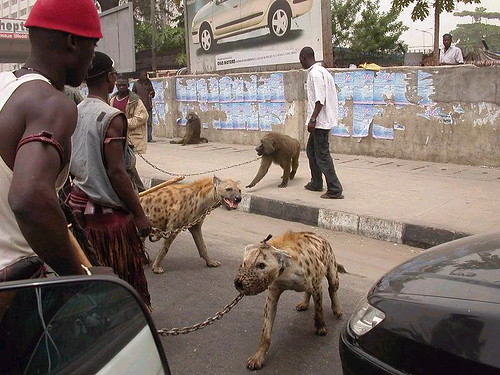This is a dual-language blog entry. Nigerian Pidgin first, then the translation to en-US.
Poverty no good at all, oh
Na him make I join this business
419 no be thief, its just a game
Everybody dey play am
If anybody fall mugu, Ha! my brother, I go chop am
Translation: Poverty sucks, so I joined this business. 419 isn't stealing--it's just a game. Everybody does it. If anyone is stupid enough to fall for it, I'll get away with what I can.
National Stadium na me build am
President na my sister brother
You be the mugu, I be the master
Oyinbo I go chop your dollar, I go take your money disappear
you are the loser I am the winner
Probably no translation needed except to mention that Oyinbo means white man. Osuofia is a character from a few popular Nollywood comedy films, and really what this song is doing is two-fold. It's providing some fictional escape from the too real problem of poverty in Nigeria, among honest people and dishonest alike. It's also skewering the outrageous claims of 419 scam artists, along with the outrageous gullibility of those who fall for such claims. Think of it: you walk up to a man on a small town Nigerian street (say Okigwe, where I went to secondary school). You tell him "hey, if you were to send Americans an e-mail telling them you're the widow of the President, and that if they can get you $10,000 you'll get them $1,000,000 the president stole from his people." You might expect his reaction to be: "I can't imagine who would fall for such a silly story, but if they did, I don't feel sorry for them, because why should they want to help in theft from people who can so ill afford to lose anything?" You could also imagine this man wandering back to work with no lunch (he has to skip that meal to save money) dreaming of what he could do with $10,000 from a greedy, gullible hand overseas. Then a year later you go back to that same man and you tell him "Remember that scam I told you about? Well it's been going gangbusters, and there have been a lot of victims, and now people look at all Nigerians as just a bunch of spammer/scammers." Imagine his combination of bemusement, bewilderment and contempt for both the scammers and the vics. Most Nigerians handle such nonsense with black irony, and this is precisely the spirit of "I go chop ya dollar". I'd say that's obvious to any Nigerian who hears it, and the festive tone of the song is just the broadest clue. 419ers who enjoy the song probably employ intentional double irony. Which means, of course that the use of the song in the close of "This American Life" represents a triple irony. Which is pretty cool, even if they unwittingly gave the wrong impression about the song's audience.



